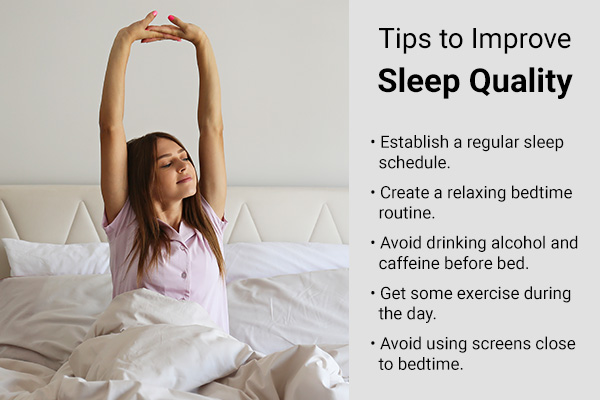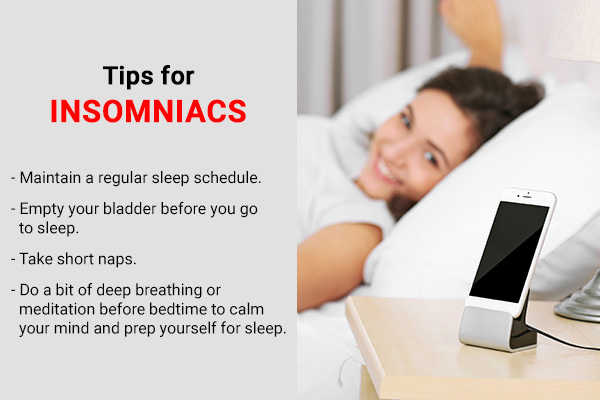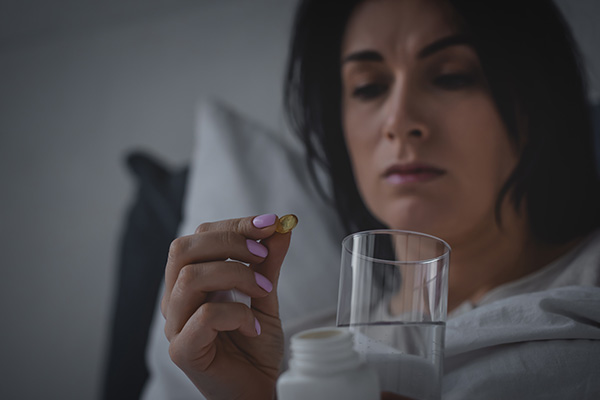In this article:
Insomnia is a common sleep disorder that affects millions of people worldwide. Whether it’s due to stress, anxiety, depression, or a disrupted sleep schedule, insomnia can have a significant impact on daily life.

The good news is that many effective home remedies can help to alleviate the symptoms of insomnia and improve sleep quality. From establishing a regular sleep routine to trying relaxation techniques, there are many simple and natural ways to improve the quality of your sleep.
This article will explore some of the most effective home remedies for insomnia, as well as tips for optimizing your sleep routine.
What You Can Do to Get Better Sleep
These techniques have been shown effective in improving insomnia.
1. Practice mindfulness
You could reduce your stress and improve your ability to obtain and maintain sleep by practicing mindfulness. It comprises concentrating on the current moment and letting go of unfavorable feelings and ideas.
A study showed that mindfulness can help reduce insomnia, anxiety, and depression. (1) If you’re struggling with insomnia, give mindfulness a try. There are many ways to practice mindfulness, such as meditation, yoga, or simply paying attention to your breath.
Start by finding a comfortable place to sit or lie down. Focus on your breath and close your eyes. As you inhale and exhale, pay attention to the sensation of your breath moving in and out of your body. If you find your mind wandering, gently return to focus on your breath. Continue this for 5–10 minutes.
2. Do yoga

Before using any medicine to treat your insomnia, you might wish to try some helpful yoga poses. Yoga can help promote relaxation and improve sleep quality.
According to one study, those who practiced yoga for 4 weeks had better nighttime sleep and felt more awake throughout the day than those who didn’t. (2)
There are many different types of yoga, so it’s important to find one that’s right for you. It’s advisable to begin with a yoga class or book for beginners if you’re new to the practice. Once you’re more familiar with the basic poses, you can try a more advanced class or practice at home.
Yoga is a great way to wind down before bed and can help you get the restful sleep you need.
3. Exercise regularly
Exercise is a great way to improve the quality and quantity of your sleep. However, it’s important to choose the right type of exercise and time it correctly. (3)
Here are some tips:
- Do moderate-intensity aerobic exercise such as walking, swimming, or cycling for 30 minutes on most days of the week.
- Avoid exercising within 2 hours of bedtime as it may make it harder to fall asleep.
- If you have trouble sleeping, try doing relaxation exercises such as yoga or stretching before bedtime. (4)
4. Ambient temperature regulation
There are a few things you can do to regulate the ambient temperature and make your bedroom more conducive to sleep.
First, adjust the thermostat so that the room is cool, but not too cold. A temperature around 65°F or 18–20°C is ideal. You can also use a fan to circulate the air and create white noise, which can help you fall asleep.
Finally, make sure that your bedding is comfortable and breathable so that you don’t get too hot or too cold during the night. (5)
5. Improve your sleep habits
A variety of things can improve sleep habits and help you get a better night’s sleep. Follow these tips:

- Establish a regular sleep schedule. Every day, go to bed and get up at the same time, even on weekends. By doing this, you may teach your body to wake up and go to sleep at regular intervals.
- Create a relaxing bedtime routine. Spend a few minutes doing something relaxing before you go to bed, such as reading or taking a bath. Your body will receive a cue from this that it is time to wind down for the evening.
- Avoid drinking alcohol and caffeine before bed. These two drugs have the potential to disrupt sleep. Avoid caffeine in the afternoon and evening, and only have one glass of alcohol each day.
- Get some exercise during the day. Exercise can help improve your sleep by making you tired at night. However, avoid working out right before night because it could be difficult to fall asleep.
- Avoid using screens just before night. The natural sleep cycle of your body might be thrown off by the blue light from devices. Before going to bed, try to put gadgets away for at least an hour. (6)
6. Try using herbs at home
If you’re looking for a more natural way to treat insomnia, you can try a few herbs. Both chamomile and lavender are well-liked options for unwinding and sleeping. Before going to bed, you can consume chamomile tea or put a few drops of lavender oil on your pillow. (7)(8)
Valerian root is another herb that’s often used to treat insomnia. (9) It is available in capsules or tinctures, which you can take before bedtime.
Passionflower is another option worth considering. Although this herb is typically harmless, some drugs may interfere with it, so consult your doctor before using it. (10)(11)
7. Drink a glass of warm milk prior to bedtime
One of the most popular home remedies for insomnia is warm milk. Many people find that drinking a glass of warm milk before bed helps them to fall and stay asleep through the night.
Warm milk is effective for insomnia because it contains tryptophan, an amino acid that plays a role in regulating sleep. (7) If you are struggling with sleep, it may be worth trying a glass of warm milk before bed.
8. Consume these sleep-inducing foods
Many different foods can help you get a good night’s sleep. Here are some of the best:

- Cherries – Melatonin is a hormone that aids in sleep regulation, and cherries are a natural source of this hormone. To reap the most benefits, eat a few cherries at night or sip cherry juice. (12)
- Bananas – Bananas contain magnesium, which helps relax the muscles and promote sleep. Eat a banana an hour before bedtime for the best results. (13)(14)
- Oatmeal – Oatmeal contains carbohydrates that help induce sleepiness. It also contains tryptophan, an amino acid that promotes sleep. (15)(16) Try eating oatmeal for dinner or as a bedtime snack.
- Dairy products – Milk and yogurt are dairy items that contain calcium, which has been demonstrated to aid with sleep promotion. Dairy also contains tryptophan, which can help you fall asleep faster. (16) Drinking warm milk before bed or eating yogurt as a bedtime snack will help in a deep, restful sleep.
- Herbal tea – Herbal teas like chamomile and lavender tea can help promote relaxation and sleepiness. (17) Drink a cup of herbal tea about 30 minutes before bedtime for the best results.
9. Give essential oils a try
A number of essential oils can be used to help promote sleep and relieve insomnia.
One of the most commonly used and beneficial essential oils for insomnia is lavender oil. It can aid in promoting sleep since it has a soothing and relaxing impact on the body and mind.
Another well-liked essential oil for sleeplessness is chamomile. It has similar effects to lavender oil and can also help to reduce anxiety and stress levels, which can contribute to insomnia. (17)
Bergamot oil, sweet marjoram oil, and sandalwood oil are other essential oils that have been proven to be successful in treating insomnia. These essential oils can be blended with other ingredients for a bath or massage or used in a diffuser.
10. Take a hot bath
There’s nothing quite like a hot bath to help you de-stress and get ready for bed.
If you’re having trouble falling asleep, try taking a hot bath an hour or so before you hit the sack. The heat relaxes your muscles and prepares your body for restful sleep.
Adding a few drops of lavender essential oil to your bedtime bath can also help to promote sleep.
Additional Tips to Help Deal With Insomnia

Here are some additional tips you can try:
- Maintain a regular sleep schedule. (18)
- Regardless of how much sleep you had at night, wake up at the same time. Set an alarm, if necessary. (18)
- Before you go to sleep, empty your bladder.
- Avoid taking multiple or long naps during the day; a single short nap is effective. (19)
- Many get relief from breathing exercises or meditation before bed. (20)
- Play peaceful, calm music in the background. Having calm and relaxing meditation music playing in the background as you meditate is a great method to relax your thoughts. Do not play anything if you would rather be silent.
- Maintain a diary by making a list of all the things you need to get done tomorrow and everything you’re worried about right now. You could even include it in your sleep diary or start a bullet notebook to keep track of everything in your life. Asking yourself questions such as “How much will this anxiety matter tomorrow?” might be helpful. Changing your attitude might help you feel less anxious.
- Instead of lying in bed and failing to sleep, move to another room, sit there for 5 minutes, and then return to the bedroom.
- Visit a counselor or psychiatrist in your area if you are having trouble falling asleep, but try not to worry about it all day long.
- Finally, set up another peaceful area in your house if, for some reason, you enjoy reading in bed. Do not watch TV or do business in your bedroom. To make your bed seem cozier, place a bunch of fresh flowers or an aromatherapy diffuser there.
Most-Asked Questions About Insomnia
Can insomnia be cured?

Insomnia is a treatable condition, but it may not be fully curable in all cases. With the right combination of lifestyle modifications and medical treatment, however, individuals with insomnia can improve their sleep patterns and reduce their symptoms.
Regular follow-ups with a healthcare professional can help to monitor progress and adjust treatment as needed.
How long does it take for insomnia treatment to work?
The length of time it takes for insomnia treatment to work will depend on the severity of the symptoms, the underlying cause, and type of treatment.
Some individuals may see improvement in their sleep patterns within a few days or weeks of starting treatment, while others may take longer to experience significant results.
It’s important to be patient and consistent with the treatment plan, as well as to communicate any concerns or questions with a healthcare professional.
Can I treat insomnia on my own, or do I need to see a doctor?
While some people with mild symptoms of insomnia may be able to treat their condition on their own with lifestyle changes and natural remedies, it’s important to seek medical advice if the symptoms are persistent or severe.
A healthcare professional can help to diagnose the underlying cause of insomnia and provide a personalized treatment plan that is tailored to the individual’s needs and circumstances.
Additionally, some individuals may require medications or psychological therapies to manage their symptoms effectively.
How long do I have to use home remedies for insomnia to see results?
The length of time it takes to see results with home remedies for insomnia will depend on the severity of your symptoms, how consistent you are with the remedies, and the underlying cause of your insomnia.
For some people, the remedies may work within a few days or weeks, while others may take longer to see significant improvement.
Can home remedies for insomnia be used in conjunction with medication?
Yes, home remedies for insomnia can be used in conjunction with medication, but it’s important to consult with a doctor before combining treatments.
Some medications may interact with natural remedies, and your doctor will be able to advise on the best approach for your individual needs.
Are home remedies for insomnia effective for everyone?
Home remedies for insomnia may not work for everyone, as everyone’s sleep patterns and triggers are unique. It’s important to be patient and persistent with the remedies and to consult with a doctor if you don’t see any improvement after several weeks of trying.
Your doctor can help to identify the underlying cause of your insomnia and provide a personalized treatment plan.
Final Word
It is essential to understand the reasons behind insomnia. If there is an underlying medical condition, please take advice from a qualified health professional. This article outlines simple home remedies that may help relieve insomnia.
 Continue ReadingInsomnia: Causes, Symptoms, and Treatment
Continue ReadingInsomnia: Causes, Symptoms, and Treatment
- Was this article helpful?
- YES, THANKS!NOT REALLY


